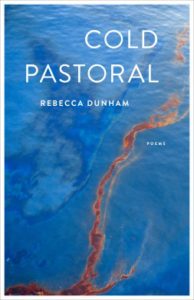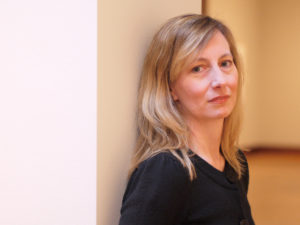 Book Title, Press, Year of Publication:
Book Title, Press, Year of Publication:
Cold Pastoral, Milkweed Editions, 2017
Synopsis: The spine of Cold Pastoral consists of poems that respond to the 2010 Deepwater Horizon oil spill, both its environmental and human consequences, through both lyric and documentary techniques.
What do you think makes your book (or any book) a “project book”?
I would characterize Cold Pastoral as a “project book” because of its tight focus on the Macondo oil spill. Even in those poems that branch off of that central concern, the connections to the primary “disaster” are clear. The documentary techniques that I made use of were also intrinsically connected to the subject.
Why this subject (or constraint)?
When the Deepwater Horizon spill happened, I found myself surprisingly drawn to the coverage of it. I wanted to write about it. At the time, I was finishing work on my book Glass Armonica, which looked at sexual violence and women’s bodies in our society, but through a very intimate lens. With each book, I push myself to try something new, to not repeat myself, and a book that faced outward seemed like a challenge I needed to undertake. One of my favorite poets is Muriel Rukeyser, and I have read and taught “The Book of the Dead” too many times to count. I wanted to explore a public subject and a documentary method. Cold Pastoral is the result of this experiment.
Are you comfortable with the term “project book”?
While the term “project book” can prove useful as a sort of shorthand for some collections, I believe it reduces collections to a single theme, erasing the many layers and the complexity of successful books. Just as a poem should not dissolve into paraphrase, the sum of a book should not be its putative “project.”
Was your project defined before you started writing? To what degree did it develop organically as you added poems?
My “subject” was to center around the Deepwater Horizon oil spill. I knew, however, that part of my interest was in the evolution of the pastoral elegy and what function it could now serve in a time of ecological crisis. How could it remain relevant? I wanted to weave in mythological elements, as well, because I was interested in the stories we tell ourselves as we try to make sense of the world around us. These three concepts were my starting point. The method (documentary and lyric), as well as variations on the theme (I also address the Flint water crisis and natural disasters wrought by climate change), evolved as I wrote.
Did you allow yourself to break your own rules?
I didn’t give myself rules, though I did at one point think the entire collection would be documentary in form. The most interesting part of establishing a regular pattern or rule, though, is the moment or moments when one departs from it. So I didn’t fight the impulse to vary things when it arose.
How important was it for you that each poem could “stand on its own” or that the poems should rely on other poems in the book, or on the premise of the project itself, to succeed? What challenges did this present for you when writing single poems or structuring the book overall?
There are a couple of poems in Cold Pastoral, such as “Initial Exploration Report: Macondo Well,” that I am not sure stand on their own. I frequently write poetic sequences, however, and there are many of these in the book. Within a sequence, I don’t generally expect the sections to stand alone. This seems to be a case of having my cake and eating it, too.
At any point did you feel you were including (or were tempted to include) weaker poems in service of the project’s overall needs? This is a risk, and a common critique, of many project books. How did you deal with this?
No, I was not tempted to include weaker poems. This is my second “project book,” however, and I remember that impulse well from the earlier one (The Flight Cage, in which Mary Wollstonecraft loomed large). After that book was accepted for publication, my very wise editor challenged me to see how many of the Wollstonecraft poems I could remove without sacrificing the book’s integrity. It turned out that some of the poems I’d included to bolster the Wollstonecraft through line were less successful and less integral to the book, so I cut them. I have a strong preference for books that are tightly focused and in that sort of collection, every poem must count.
What effect do you think the prevalence of project books is having on poetry in general?
The popularity of poetry collections that organize themselves around a singular subject is a mixed bag. On the one hand, these books allow poets to delve deeply into a subject and show us its many facets, complicating a seemingly simple idea. Books like Michelangelo’s Seizure by Steve Gehrke, Breach by Nicole Cooley, Thomas and Beulah by Rita Dove, and Meadowlands by Louise Glück (to name just a few) are all examples of this.
On the other, one can sense in some of these books that the form, or project constraint, has hijacked the collection. Just as a sonnet that is controlled by its form suffers, a book in which the project becomes a fetish of sorts will ultimately disappoint.
As an editor, how do you see the prevalence of project books and other poetic constraints affecting your submission pile and how you select work for publication?
When I read a “project book,” I tend to have a strong response. I want to distinguish, here, between books with a very tight unifying theme and those with a central subject that could qualify as a project. I am usually quite drawn to those with a unifying theme—as with a recent collection by Michael Torres that I read. I like the focus, the way every poem adds to and complicates the theme. In a project book, I either am interested in the subject, or not. The writer of a book whose subject is not inherently interesting to me has an upward trek to convince me of the book’s success. It is by no means an impossible task (I can think of several books that have accomplished this), but overcoming a reader’s initial resistance is not usually the place one wants to be when trying to publish or market a book.
Have you abandoned other project attempts? How did you know it was time to let go? What happens to project poems that never amass a full-length book?
I abandon poems and projects all the time! It is never a fun thing. I have a cache of poems filed away, some of which have been published in journals but that have yet to find a place in a book. This fate disproportionately befalls poems from failed projects. Or, sometimes, only one or two poems from a project emerge as being strong enough to earn a spot in a poetry collection. I write by following my obsessions; unfortunately, after a while, the project may start to bore me or not yield the rich results I anticipated. At that point, I print them all up, secure the pages with a binder clip, and then slip the stack into a neatly labeled manila folder. This folder rests with other incomplete attempts in my filing cabinet.
Another option is to assemble a chapbook. I frequently toy with this idea, but the only chapbook I’ve published to date is what I would characterize as an extended poetic sequence.
After completing a project, how did you transition into writing something new? What are you working on now? Another project?
I tend to have several ideas floating around at any point. Because of my affinity for poetic sequences, I think I naturally gravitate toward “projects.” It can take me a while to get to an idea, so the least interesting ones have hopefully fallen away before I embark on the writing. The collection I am working on now is thematically unified around the subject of marriage and aging, but I wouldn’t characterize it as a project book.
What advice can you offer other writers, particularly emerging writers or poetry students who may be using the project book as a guiding principle for their own work?
Follow your obsession. Don’t let anyone dissuade you.
If the subject is no longer a subject you feel compelled to pursue, however, it is time to stop. Readers can tell when you are writing by rote or to fulfill a formula. Poetry as an endeavor is too rarely read and too poorly compensated to waste one’s time writing something that doesn’t move you anymore. After all, if you aren’t interested, why would anyone else be?


